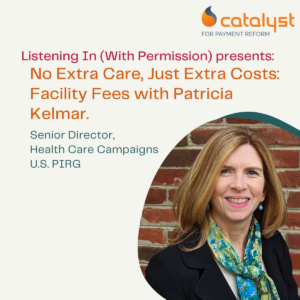Andréa Caballero, Vice President of Policy at Catalyst for Payment Reform, calls Patricia Kelmar, Senior Health Care Campaigns Director for U.S. PIRG to discuss one of the most pressing issues in healthcare affordability: facility fees.
These hidden charges now significantly inflate medical bills, even for routine visits and telehealth appointments. With her extensive experience in patient safety and healthcare advocacy, Patricia explains how these fees are spreading and the policy actions underway to address them.
Read U.S. PIRG’s report on Facility Fees here.
Key Highlights:
-
What are Facility Fees? Patricia explains how hospital-based facility fees, once limited to hospital visits, now apply to basic services like annual checkups and even virtual consultations. These fees, unrelated to the actual service, stem from large hospital systems purchasing independent physician practices.
-
The Growing Issue of Consolidation: Patricia discusses how healthcare system consolidation drives up costs for patients, especially through unnecessary facility fees. She shares a real-life example of a patient facing financial hardship due to these fees and the lack of transparency surrounding them.
-
State and Federal Solutions: Although federal efforts progress slowly, Patricia highlights the more active role states are playing in banning facility fees. States like Connecticut have already implemented strong bans, with more following suit. Patricia urges listeners to support state-level bans and advocate for more transparent billing practices.
-
Call to Action for Employers and Employees: Patricia encourages employers to engage in the conversation by asking employees about facility fees and supporting efforts to eliminate them. She stresses the importance of coalitions and grassroots organizations in raising awareness and driving policy change.
This conversation brings attention to a critical issue affecting millions of Americans and provides actionable steps to combat the growing burden of healthcare costs.
For more information, visit U.S. PIRG’s website to access resources and learn how you can help push for change in your state.

